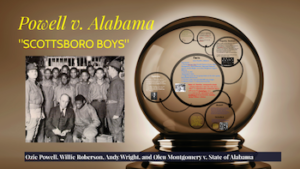
*On this date in 1932, Powell v. Alabama, 287 U.S. 45, was decided. This was a landmark Supreme Court decision in which the Court reversed the convictions of nine young black men for allegedly raping two white women on a freight train near Scottsboro, Alabama.
In March 1931, nine black men—Charlie Weems, Ozie Powell, Clarence Norris, Olen Montgomery, Willie Roberson, Haywood Patterson, Andrew (Andy) Wright, Leroy (Roy) Wright, and Eugene Williams, later known as the Scottsboro Boys, were accused of raping two young white women, Ruby Bates, and Victoria Price. Most Courts reasoned that the right to retain and be represented by a lawyer was fundamental to a fair trial and that, at least in some circumstances, the trial judge must inform a defendant of this right. In addition, if the defendant cannot afford a lawyer, the Court must appoint one sufficiently far before trial to permit the lawyer to prepare adequately for the trial.
All the defendants, except for 13-year-old Roy Wright, were sentenced to death in three one-day trials. Under military guard to protect them from mob violence, the defendants were not told they could hire lawyers or contact their families. They had no access to a lawyer until shortly before trial, leaving little or no time to plan the defense. They appealed their convictions because the group lacked adequate legal counsel. The Alabama Supreme Court ruled 7-2 that the trial was fair. Chief Justice John C. Anderson wrote a strongly worded dissenting opinion.
The defendants appealed the Alabama Supreme Court's ruling to the U.S. Supreme Court. Powell was the first time the Court had reversed a state criminal conviction for violating a criminal procedural provision of the United States Bill of Rights. The Fourteenth Amendment, Due Process Clause, included at least part of the right to counsel in the Sixth Amendment, making that much of the Bill of Rights binding on the states. Before Powell, the Court had reversed state criminal convictions only for racial discrimination in jury selection, a practice that violated the Equal Protection Clause of the Fourteenth Amendment.